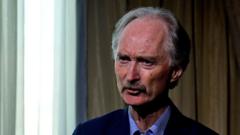Geir Pedersen, the UN Special Envoy for Syria, has called upon the newly formed leadership following the recent ousting of President Bashar al-Assad to adhere to its commitments to protect the rights of Syria's diverse population. In an interview with the BBC conducted in Damascus, Pedersen noted the prevailing dual sentiment of hope and fear among Syrians as they navigate their new political landscape.
The regime was overthrown less than two weeks ago by a rebel coalition dominated by Hayat Tahrir al-Sham (HTS), a Sunni Islamist faction that has distanced itself from its jihadist lineage since breaking away from al-Qaeda in 2016. While HTS is designated a terrorist organization by several international entities, its leader, Ahmed al-Sharaa—formerly known as Abu Mohammed al-Jolani—has claimed his group is now a nationalist movement prepared to coexist with Syria's other communities.
Despite his positive remarks, Pedersen acknowledged that skepticism remains among the Syrian populace regarding HTS's intentions due to its history. He emphasized the necessity for a collaborative approach in governance that includes various opposition factions and civil society leaders, particularly women, to ensure a successful transition.
Pedersen expressed the international community's willingness to support this new leadership, but he cautioned that any decisions such as lifting sanctions or removing HTS from the terrorist list will depend on tangible actions reflecting their commitments. He expressed a willingness to give HTS three months, the stipulated time for its interim governance, to demonstrate its dedication to reform.
Moreover, he pointed out the destabilizing actions of Israel in the region, particularly concerning its military operations and territorial claims in the Golan Heights, calling for immediate cessation of actions that could undermine Syria's fragile transition.
The special envoy also raised concerns about the role of Turkey, which maintains military relations with HTS and has engaged in conflicts with Kurdish-led forces in northern Syria. Pedersen stressed the need for regional stability to avoid further displacements and encourage the return of refugees to the region.
Having experienced years of civil unrest and violence, the Syrian population is now besieged by questions about justice for the tens of thousands who have disappeared under prior regimes since the onset of the civil war. Pedersen highlighted that without a genuine effort towards accountability, there exists a risk of renewed conflict that would derail any advancements made.
He concluded with a cautious optimism, advocating for a restoration process that could lead Syria towards healing, while warning that failure to implement promised reforms could result in further strife. He implored stakeholders to foster an environment that supports the Syrian people's ownership of their future and rebuild the war-torn nation.
















